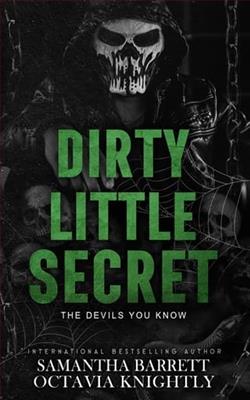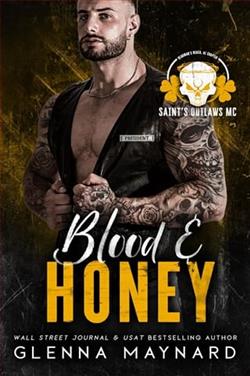Page 36 of Wicked Fantasies
Because that was the one thing she could never survive—losing him.
Before she could maintain her composure and try to explain, Ross turned away from her, his tone suddenly devoid of emotion. “I can see I’ve made a mistake. I clearly thought there was more between us and I’ve asked for more than you are capable of giving. Forgive me. Goodbye, Julia.”
With that, he left the cabin. Julia’s feet felt as if they’d been sunk into concrete. She heard the slamming of his car door and the turning over of the engine, but she couldn’t move a muscle.
Small gravel pelted the front door as the car sped away down the mountain and still she stood frozen in place. It felt as if hours had passed before her body gave up its fight to remain upright and she collapsed into a heap upon the floor. Great sobs ripped through her as she replayed their last conversation over and over.
And the one word that continually came back to haunt her…Julia.
He’d called her Julia.
Chapter Ten
The days turned into weeks and time lost all meaning as Julia worked relentlessly on her novel. She slept only a few hours a night, many times jerking awake in a cold sweat, Ross’s name upon her lips. She ate when she remembered to, which wasn’t very often.
Twice, she ventured off the mountain to replenish her supplies. There wasn’t a scale in the cabin, but by the looseness of her clothing, she suspected she’d lost at least ten pounds.
After Ross’s departure, it had taken her nearly a week to pull herself from the bed and the deep depression into which she’d sunk. During that week, memories of her parents’ deaths haunted her. She could swear she heard Duke meowing at various times of the day.
The image of Ross’s face when she laughed at his declaration of love tore her heart to pieces.
Convinced she was losing her mind, Julia gave herself up to sleep to avoid the pain—only rousing to relieve herself, eat a few bites of food or throw an occasional log on the fire when the cabin became bone-chillingly cold.
After a week of self-pity, she roused herself enough to leave the sanctuary of her bed and make a plan. In spite of her best efforts not to suffer another debilitating loss, she had. Her own foolish fears had cost her the love of her life—the only man she could ever imagine marrying and having children with.
Refuting Ross’s declaration hadn’t saved her pain, but given it—unbearable amounts of soul-rending, heartbreaking aches that took her breath away. For two days, she plotted and planned, determined to win back the heart of her best friend. With her course set, she sat down to write. Her words were her only weapon, her only power.
In the dark of the night, when she awoke with tears streaming down her face, she sat down to write.
When loneliness ate at her insides like a cancer, she sat down to write.
When the memories of Ross’s arms around her felt like a vise squeezing the life out of her heart, she sat down to write.
Only the novel kept her going.
Once she’d roused herself from depression and risen from her bed, she started taking long walks in the snow, communing with Mother Nature as she felt the wounds of the past slowly heal. There was a lot to be said for the healing effects of the natural world.
Finally, after two months and three more snowstorms, the manuscript was complete. As a butterfly emerges from its cocoon, Julia felt she was coming alive again. Pleased with her efforts, she spent the next four days cleaning the entire cabin from top to bottom and packing up to prepare for her return to the city.
The real world.
Ross.
Driving down the mountain, Julia felt hopeful for the first time in weeks. Taking her time, she traveled back to New York like a lady of leisure, a person with nothing but time on her hands. She emailed her novel to Ross using the free wi-fi at the first Starbucks, then she bought a map and proceeded to take every back road she could find, eschewing the busy interstates in favor of exploring the small towns along the way, even stopping in Easton, Pennsylvania to tour the Crayola Factory. Walking around the displays with a tour group of elementary-school children, she felt very much like a child herself again.
It was as if she were starting her life anew, everything fresh and unique.
Unfamiliar and unexplored.
She took pleasure in the small things. Trying something different to eat at a restaurant. Stopping at overlooks along the way. Watching the arrival of spring and taking in the scenery as she drove—signs of the green season were sprouting up everywhere. A city girl by birth, she’d never fully appreciated all nature had to offer until her time in the cabin.
Riding with the windows down, she inhaled the smells of budding trees, blooming flowers and rain-soaked earth. Smiling, she took delight in everything she saw, feeling as if she were a blind woman who’d suddenly been granted the gift of sight. Even her return to the city—full of hectic traffic-packed streets, cursing, angry commuters, and taxicabs blaring their horns—did nothing to dim her new, happy outlook on life.
For the first time in her life, she felt free. Free to chart her course and achieve her goals. Goals she would stop at nothing to reach.
Entering her apartment exactly one week to the day she left the cabin, Julia dumped her suitcase in her bedroom and ventured out onto her tiny fire escape. Smiling, she yelled “Hello” to the familiar old neighborhood before setting out to unpack her clothing, aware her time in this apartment was waning away.
Changes were coming.















